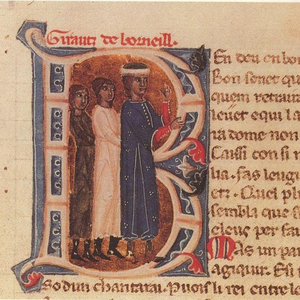
| Trackimage | Playbut | Trackname | Playbut | Trackname |
|---|---|---|---|---|
| 83583492 | Play | Reis glorios | 00:00 Tools | |
| 83583493 | Play | Non puesc sofrir | 00:00 Tools | |
| 83583494 | Play | Non puesc sofrir (Bornelh) - Contrafactum: Ar me puesc (Cardenal) | 00:00 Tools | |
| 83583495 | Play | Lamento di Tristan | 00:00 Tools | |
| 83583498 | Play | Reis glorios: Ouverture (arr. S. Bergeron) | 00:00 Tools | |
| 83583496 | Play | Reis glorios, verais lums e clardatz | 00:00 Tools | |
| 83583497 | Play | c.1140-c.1200)_ Non puesc sofrir; Peire Cardenal (_1180-_1278)_ Ar me puesc (contrafactum) | 00:00 Tools | |
| 83583500 | Play | Reis glorios - D'eisa la razon | 00:00 Tools | |
| 83583505 | Play | Reis glorios, verais lums e clardatz (arr. S. Bergeron) | 00:00 Tools | |
| 83583499 | Play | Leu chansonet' e vil | 00:00 Tools | |
| 88593066 | Play | Leu chansoneta | 00:00 Tools | |
| 83583501 | Play | Non puese sofrir | 00:00 Tools | |
| 83583502 | Play | Reis glorios, verais lums e clardatz (arr. for vocal and chamber ensemble) | 00:00 Tools | |
| 90269364 | Play | Si-us quer conselh, bel ami Alamanda | 00:00 Tools | |
| 83583503 | Play | Reis glorios (instrumental) | 00:00 Tools | |
| 83583504 | Play | Si us quer conselh, bel' ami' Alamanda | 00:00 Tools | |
| 83583506 | Play | Reis Glorios, Verais Lums E Clartatz | 00:00 Tools | |
| 83583507 | Play | No posc sifrir c'a la dolor | 00:00 Tools | |
| 83583508 | Play | Chanson "No puesc sofrir c’a la dolor" | 00:00 Tools | |
| 83583509 | Play | Non Puesc Sofrir qu'a la dolor | 00:00 Tools |

-
- 4,278
- plays
-
- 1,385
- listners
-
- 4278
- top track count
Giraut de Bornelh (c. 1138 – 1215), also known as Guiraut de Borneil(l), was a troubadour, born to a lower class family in the Limousin, probably in Bourney, near Excideuil. Connected with the castle of the Viscount of Limoges, his skill earned him the nickname of "Master of the Troubadours". He is credited with the formalisation, if not the invention, of the "light" style, or trobar leu. About ninety of his poems and four of his melodies survive. One of his best pieces is a planh (lament) on the death of Raimbaut of Orange. In a tenso with king Alfons II of Aragon Giraut contributes to the poetical debate as to whether a lady is dishonoured by taking a lover who is richer than herself. This debate was begun by Guilhem de Saint-Leidier, taken up by Azalais de Porcairagues and Raimbaut of Orange, and continued in a partimen between Dalfi d'Alvernha and Perdigon. There is the possibility that he accompanied Richard I of England and Aimar V of Limoges on the Third Crusade and stayed a while with the "good prince of Antioch", Bohemond III. He certainly made a pilgrimage to the Holy Land, but perhaps before the Crusade. Read more on Last.fm. User-contributed text is available under the Creative Commons By-SA License; additional terms may apply.